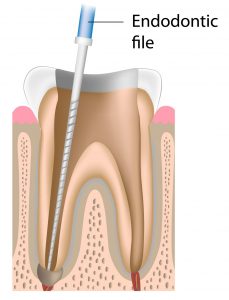In root canal treatment, as with any medical and dental procedures, there is always the risk of complications. One of the inherent risks in root canal therapy is broken instruments.

Dentists use metal instruments known as files to remove infected tissues in the root canal and prepare the canals to the desired shape. Of necessity, these files are tiny, so they are fragile. Occasionally they may engage in the canal and break. The incidence of file fracture is estimated to be around 3 per cent of all root canal treatments. It is more likely to happen in teeth that have unusually curved roots or in very narrow canals, in these cases your dentist might advise you to see a specialist in root canal treatment for management.
By themselves, broken files do not cause pain or any other harm to the teeth and surrounding tissues. These days, the materials most commonly used to make such files are nickel–titanium alloy and stainless steel. Both are sterile medical-grade metals and are completely stable. Just like a titanium tooth implant or a metal knee replacement implant, they do not corrode or leak. The files can, however, obstruct cleaning and/or disinfection of the canals during the remainder of the root canal treatment.
If a file breaks during treatment, we either bypass it or retrieve it, depending on its size and location. In some cases, removing the broken files might not be best for the long-term survival of the tooth as tooth structure may also need to be removed to enable removal of the fractured file and this can weaken the roots. In most cases, the files will be incorporated as part of the root filling materials. In a very small number of cases, follow-up micro-surgery might be needed. This may be performed at a much later date, if ever required.
A broken file is not likely to have any impact on the long-term survival of the treated tooth. Most importantly, extraction is highly unlikely to be required. And certainly, the file will not trigger a metal detector at the airport security gate!

